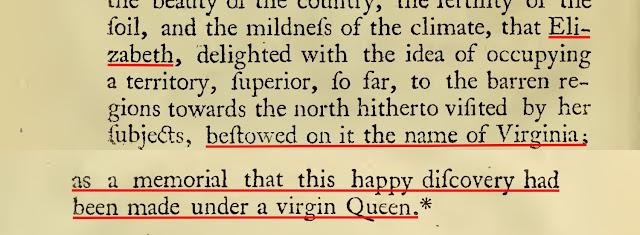Virginia, its source (Robertson, The History of America, Books IX and X, 1799)
Type: a quote
Sub-type: historical fact
Relevance: prophecy
Text: "And the serpent [the dragon] cast out of his mouth water as a flood after the woman, that he might cause her to be carried away of the flood. And the earth helped the woman, and the earth opened her mouth, and swallowed up the flood which the dragon cast out of his mouth." Revelation 12:15,16 "And I beheld another beast coming up out of the earth; and he had two horns like a lamb, and he spake as a dragon." Revelation 13:11 ...a planted beast/nation! ...another lamb, as opposed to the true Lamb of God! ["And ... the angel Gabriel was sent... To a virgin...; and the virgin’s name was Mary. ... And the angel said unto her, Fear not, Mary: for thou hast found favour with God. And, behold, thou shalt conceive in thy womb, and bring forth a son, and shalt call his name JESUS. ... Then said Mary unto the angel, How shall this be, seeing I know not a man? And the angel answered and said unto her, The Holy Ghost shall come upon thee, and the power of the Highest shall overshadow thee: therefore also that holy thing which shall be born of thee shall be called the Son of God." Luke 1:26-38 "The next day John seeth Jesus coming unto him, and saith, Behold the Lamb of God, which taketh away the sin of the world." John 1:29]
Online Source: https://archive.org/details/historyofamerica00robe
Book Images:



Sub-type: historical fact
Relevance: prophecy
Text: "And the serpent [the dragon] cast out of his mouth water as a flood after the woman, that he might cause her to be carried away of the flood. And the earth helped the woman, and the earth opened her mouth, and swallowed up the flood which the dragon cast out of his mouth." Revelation 12:15,16 "And I beheld another beast coming up out of the earth; and he had two horns like a lamb, and he spake as a dragon." Revelation 13:11 ...a planted beast/nation! ...another lamb, as opposed to the true Lamb of God! ["And ... the angel Gabriel was sent... To a virgin...; and the virgin’s name was Mary. ... And the angel said unto her, Fear not, Mary: for thou hast found favour with God. And, behold, thou shalt conceive in thy womb, and bring forth a son, and shalt call his name JESUS. ... Then said Mary unto the angel, How shall this be, seeing I know not a man? And the angel answered and said unto her, The Holy Ghost shall come upon thee, and the power of the Highest shall overshadow thee: therefore also that holy thing which shall be born of thee shall be called the Son of God." Luke 1:26-38 "The next day John seeth Jesus coming unto him, and saith, Behold the Lamb of God, which taketh away the sin of the world." John 1:29]
[...] Elizabeth, delighted with the idea of occupying a territory, superior, so far, to the barren regions towards the north hitherto visited by her subjects, bestowed on it [the Americas] the name of Virginia; as a memorial that this happy discovery had been made under a virgin Queen.
Robertson, William, The History of America, Books IX and X,
Philadelphia: James Humphreys, 1799, pp. 44-5.
Philadelphia: James Humphreys, 1799, pp. 44-5.
Online Source: https://archive.org/details/historyofamerica00robe
Book Images:







Comments
Post a Comment